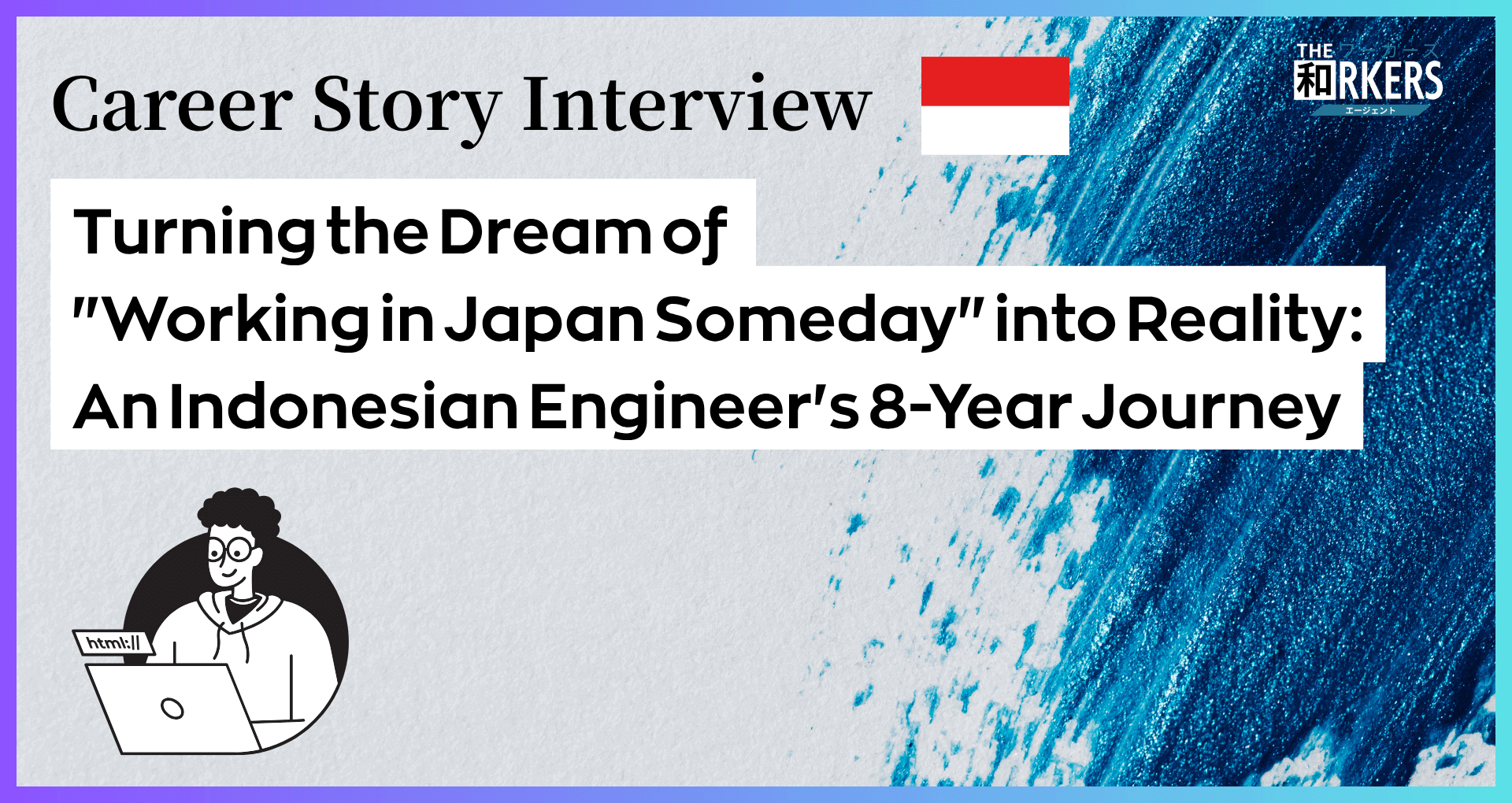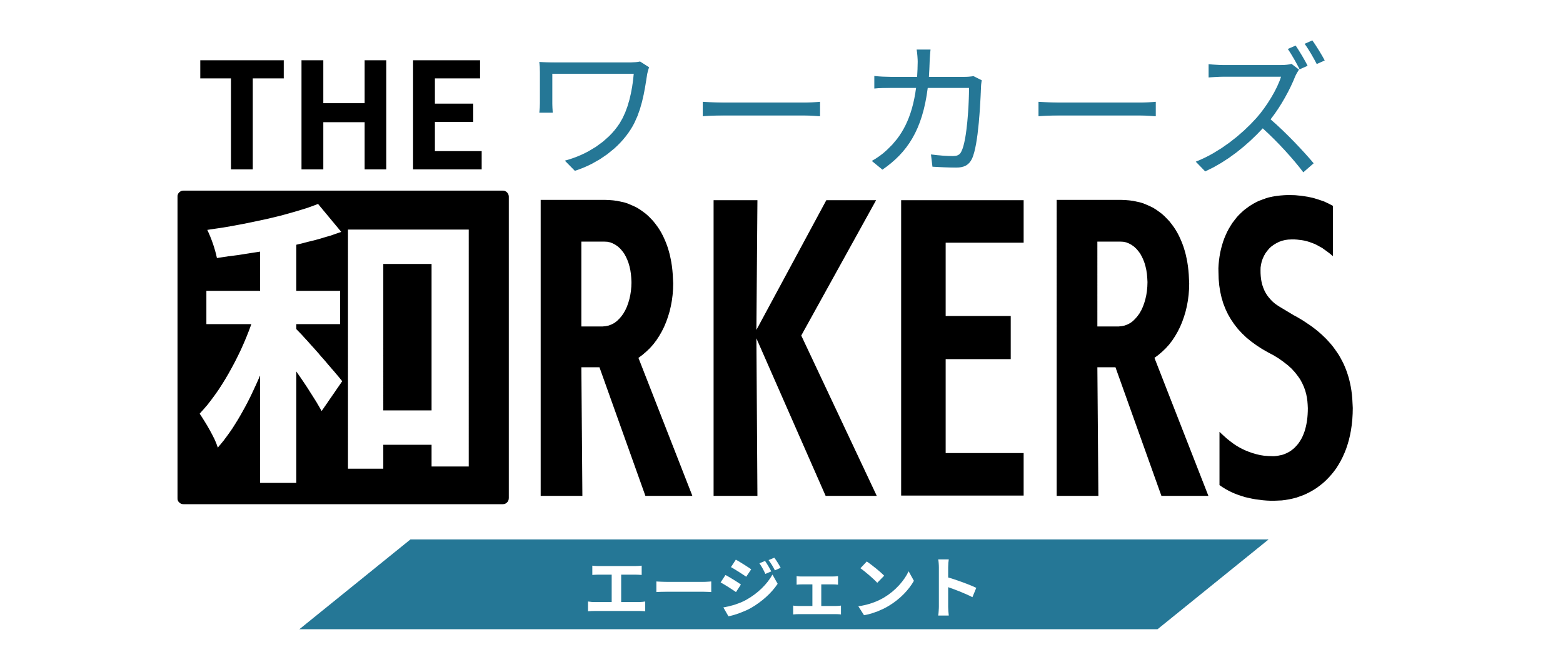Turning the Dream of “Working in Japan Someday” into Reality: An Indonesian Engineer’s 8-Year Journey

In 2017, driven by the desire to “work in Japan someday,” an engineer made the move from Indonesia. He began his career in infrastructure, transitioned into development roles, and now works on in-house web services at a business company. In this article, we explore his career journey, the difficulties he faced during job changes, the challenges and growth he experienced working in Japan, and his outlook for the future. As a foreign engineer, how did he build his career in Japan? We share his candid reflections and experiences.
The Beginning of a Dream to Work in Japan
– Please briefly introduce yourself.
I came to Japan from Indonesia in 2017. After working at two companies, I am currently employed at my third.
My journey to Japan began in late 2015, while I was still at university. A company headquartered in Japan with a branch office in Singapore visited our campus. They happened to be recruiting engineers at the time, so I applied and received an offer after a few rounds of interviews.
After that, I attended a Japanese language school while undergoing training, and eventually passed the final interview, which led to my move to Japan.
At university, I majored in software development. However, my first job in Japan was in IT infrastructure. After about three years, my desire to be involved in development grew stronger, and I changed jobs to a development-focused role at my second company.
Following three more years of experience, I felt ready to test my skills at a business-side company, which led me to my current role.
– Were you originally interested in Japan?
Yes, I was. It might sound like a common story, but my first encounter with Japan was through anime.
Every Sunday, Japanese anime would be broadcast on TV from morning till evening, and I used to watch it all day long. For shows that weren’t aired, I would rent DVDs. Back then, DVD rentals were still the norm, so I would ask my father to rent them for me.
These anime shows had subtitles, and I remember thinking, “I want to be able to read those.” That’s what sparked my interest in learning Japanese.
By the time I was in fifth grade, I had already started teaching myself kanji.
From there, my interest expanded beyond pop culture to include Japanese history and society—especially Japan’s postwar development. I began wondering, “How did this country grow so much after the war?” and started learning more about it.
I think I had a strong desire to visit Japan someday from quite an early age.
– Do you have a favorite anime series?
Definitely Digimon.
– You mentioned that a Japanese company visited your university in 2015. Was it some kind of job fair or event?
No, not really. It wasn’t a big event. It felt more like a casual visit—nothing formal or heavily promoted.
Actually, it wasn’t someone from the Japanese headquarters who came, but rather a representative from the company’s Singapore branch.
They were touring universities in Southeast Asia, doing recruiting activities to find local talent.
My university just happened to be one of the schools they visited.
– So were you originally expecting to work in the Singapore office?
No, the job offer was for a position at the Japan headquarters.
While the recruitment was handled by the Singapore branch, the actual position was in Japan.
That’s how their hiring process was structured.
First Job Experience in Japan and the Challenges Overcome
– What kind of company did you first join in Japan?
My first job in Japan was at a staffing agency specializing in IT infrastructure.
I joined the company as a new graduate. After undergoing initial training in-house, each person was assigned to a project based on their skills and aptitude.
While most people were dispatched to work at client companies, I was assigned to an internal project within the company.
– What kind of work did you do on internal projects?
My first assignment was call center work as part of the company’s internal helpdesk operations.
My main task was answering phone calls, and honestly, I was extremely nervous at first (laughs).
I worked in that role for about two months, but one day someone said, “You can speak English too, right?” and I was reassigned to handle global projects.
From that point on, I was no longer doing phone support. Instead, I was responsible for IT infrastructure support for foreign companies without IT departments in Japan.
Specifically, I would go on-site to address issues with PCs or networks, communicate with engineers overseas to gather technical instructions, and create procedural documentation based on that information.
– That sounds like a pretty wide range of responsibilities.
It really was.
In addition to on-site support, I handled communication with overseas engineers, joined internal meetings, did interpretation, and even managed inventory.
I was the only person on the team who could speak English, so naturally my role kept expanding.
Since the client didn’t have storage space in their office, we also used our office to temporarily store PCs and other equipment.
I would set up the machines and arrange deliveries, so I was also doing logistics management.
Before I knew it, I was effectively managing the entire operation.
– By the way, you mentioned this company first came to your university in Indonesia. What made you decide to join them?
To be honest, the biggest reason was simply that “I could go to Japan.”
I’d always had a vague desire to “someday go to Japan,” but I never really thought it would happen.
So when this company came to our university and offered a chance to possibly work in Japan, I thought, “Why not give it a try?”
At the time, I didn’t have a specific preference for that company in particular.
It was more of a pure and simple motivation: “If this is a chance to go to Japan, I want to take it.”
A Passion for Creation and the Decision to Change Jobs
– You mentioned that you stayed at your first company for about three years. What led you to make the move to your second company?
Yes, to be exact, I was there for about three and a half years.
The main reason I considered changing jobs was because I strongly wanted to be involved in creating something of my own.
In university, I studied software development and systems integration, and I had always been interested in making things. I’m even a fan of building Gundam plastic models (Gunpla)—I’ve always loved crafting things with my hands.
But at my first company, my work mainly revolved around IT infrastructure operations, and there weren’t many opportunities to do development work.
After three and a half years, I felt I had gained enough experience, and I realized, “If I stay here, I’ll turn 30 before I know it.” That sense of urgency led me to decide it was time to make a move.
– How did you go about your job search? Did you work with recruiters?
Yes, but honestly, I had no idea what I was doing during my first job search.
In fact, I quit my job before even starting the job hunt.
Only after resigning did I learn that, as a foreign national in Japan, you’re generally required to secure a new job within three months of leaving your previous one due to visa regulations. If you don’t, you might have to return to your home country.
During my search, I worked with two recruiters. The first was someone from overseas, who introduced me to just one company. After the interview, they told me to “wait for the result”—but then never followed up.
The second recruiter didn’t introduce me to any roles that really matched my background or goals, so nothing came of that either. After two months of searching without results, I was in a pretty desperate situation.
Fortunately, a friend of mine—also a foreign national working at the same company—had just successfully changed jobs and recommended that I apply to their new company.
I thought I had nothing to lose, so I applied, and thankfully, I was hired. It was a huge relief.
– What kind of work did you do at your second company?
Since I didn’t have any real-world development experience, I first went through a three-month training program.
Although I had studied programming in university, working in the field was an entirely different experience, so I essentially started from scratch. I began doing small development tasks using Java on outsourced projects.
After the training, I worked briefly on an in-house project, then was assigned to a client site as an SES (System Engineering Services) developer.
At the client site, I participated in the entire waterfall-style development process—from basic design to implementation, testing, and release.
As time went on, the scope of my responsibilities gradually expanded.
In the end, I stayed on-site with that client for around three years.
The client renewed my contract every year, and I remained with the same team throughout. It was a valuable experience to work consistently on the same project for that long.
– And from there, you moved to your current company. What motivated that change?
Yes. What really motivated me was the desire to take more ownership in the things I build.
At my second company, I worked on systems like point programs and internal business tools at the client site, but my role was always as an “external” contributor.
I never had direct communication with the end client, and the work I did was just a small part of a much larger system.
Even though I was technically building things, it didn’t really feel like “my work.”
There had been talk within the company about starting original services or new businesses, but I didn’t see much progress in that direction, which made me question whether I should keep waiting.
Three years had passed, and I thought, “If I don’t act now, more time will just slip by.”
So as I approached 30, I made the decision to start looking for a job where I could feel truly proud of my work.
– What made you choose your current company from among the options?
I worked with three different recruiters during my job search and was introduced to several companies, one of which was my current employer.
In the end, I had offers from three companies, including some well-known names.
To be honest, some of those offers had better terms than my current job in certain areas.
But what really stuck with me was the second interview I had with my current company.
It was a casual dinner meeting with three of the engineering leads.
Talking directly with them in that relaxed setting made me feel, “I really want to work with these people.”
This company handles all development in-house—from planning to coding—and there’s a strong culture of “building things with our own hands.”
I strongly felt that this was a place where I could work with true ownership.
Also, rather than being a small cog in a big machine at a large company, I felt that working in a smaller, more agile team where my presence and influence mattered was a much better fit for me.
The people I met during the interviews were also very inspiring—their personalities and mindsets were compelling.
I truly felt that I could grow by working with them.
On top of that, the company is a market leader in its field within Japan, which gave me even more confidence in making the decision.
Owning the Product: My Current Role in Service Development
– What was your impression after actually starting work at your current company?
There was almost no gap between what I had imagined before joining and the reality after I started.
The work environment is very open and positive. Relationships are great, and the hierarchy is quite flat.
I feel comfortable expressing my opinions honestly, and overall communication flows well.
There’s still a strong startup-like culture, and one of the things I appreciate most is how quickly things can move—if you have an idea or want to try something, you can usually act on it without going through endless layers of approval.
– What are your current responsibilities specifically?
I’m working on the development of our in-house web services.
My main tasks include implementing new features, making improvements for scheduled releases, and handling bug fixes and system issues.
My role is primarily as a backend engineer, where I’m involved end-to-end—from system design and coding, to testing and deployment.
The service is offered both as a web application and a mobile app, but I mainly focus on backend development for the browser-based version.
My responsibilities cover a broad range, including new feature design, API development, and performance optimization.
Since both the web and mobile apps share a common API, I closely collaborate with the mobile team to ensure consistency and prevent discrepancies between platforms.
Maintaining overall quality and alignment across systems is something I always keep top of mind in my daily work.
Challenges and Support as a Foreign National Working in Japan
– You’ve now lived and worked in Japan, and experienced a couple of job changes as well. What have you found particularly difficult during this time?
There have been several challenges, but the biggest one was not having close family or longtime friends nearby.
There were a few people who came from Indonesia around the same time as me, which helped a bit, but still—being without relatives or longtime friends to casually talk to was mentally tough.
Another major difficulty was commuting every day. Especially in my earlier jobs when I had to go to the office daily, the packed trains were really exhausting. I used the Odakyu Line, and the morning rush was so intense that I would often feel worn out even before starting work.
Living alone in Japan was also a first for me. Back home, I had relied on my parents for many things, and I didn’t even have part-time job experience.
So I had to figure everything out on my own—from household chores to dealing with administrative paperwork.
At first, I couldn’t understand most of the Japanese documents, and I’d often get frustrated just trying to read them (laughs).
That said, what truly helped me through all of this was the kindness of the people in Japan.
When I first arrived, I was standing at a station with a large suitcase, looking completely lost. A police officer nearby noticed and offered to help me find my way.
That kind of kindness isn’t something you experience often in other countries, so it really stuck with me.
At city offices, too, the staff would patiently and kindly explain things even though my Japanese wasn’t great.
And from my very first company onward, I’ve been lucky to be surrounded by kind and supportive colleagues.
I genuinely feel that I’ve made it this far thanks to the people around me.
– Were there any work-related challenges that stood out?
The most difficult part was definitely handling phone calls at my first company.
To be honest, I’ve never been great with phone calls in any language, and I was placed in the helpdesk department where phone communication in Japanese was my main responsibility. That was extremely tough in the beginning.
Not only was I trying to communicate in unfamiliar Japanese, but the added difficulty of speaking without seeing the other person’s face made things even more stressful.
Every day I worked through a lot of nervousness.
On top of that, I was assigned to client-facing and managerial tasks that I had never experienced before, which added a lot of pressure as a working professional.
But what I learned from that experience was that even if something isn’t your strength, sometimes you have to do it because it’s part of your job.
At the same time, I realized how important it is to talk to your manager instead of pushing yourself to the breaking point.
After about three months, I honestly told my manager, “This role isn’t what I had in mind for my career.”
He took the time to listen to me and said, “Then let’s try assigning you to something else.”
I think the reason he responded positively was because I didn’t just say, “I can’t do this,” but also explained, “Instead, here’s where I can contribute.”
Luckily, my manager at the time was close in age and very friendly—he was from the Kansai region and had a warm, approachable personality.
It also helped that I was working in an in-house role, which made it easier to build trust and communicate with my team members since we saw each other every day.
Future Goals and a Message to Engineers Building Their Careers in Japan
– What are your future goals or career aspirations?
In the future, I hope to further strengthen my technical skills while also developing my professional social skills as a member of the Japanese workforce—such as communication within and across teams, as well as leadership.
Right now, there are still relatively few opportunities for foreign engineers to serve as team leads or managers in Japan, but I’d like to challenge myself to take that path.
I want to do more than just work as an engineer—I want to truly understand Japanese workplace culture, adapt to it, and become someone who can bring people together by making the most of my own strengths.
– Finally, do you have any message or advice for foreign nationals who are looking to build a career in Japan?
First of all, even working in your home country can be challenging—so working abroad, in a country with a different language and culture, is an even greater challenge.
That said, if you have a clear understanding of what you want to do, what your strengths and weaknesses are, and if you put effort into demonstrating your value, I truly believe you’ll find a path forward.
What’s important is maintaining a proactive attitude toward learning. Especially in Japan, there are many opportunities to learn through daily work, and making the most of those chances is crucial.
For those considering a job change, I also recommend working with recruiters. However, it’s important to choose carefully—not all agents are the same.
You should take time to analyze your goals, strengths, and weaknesses, and find an agent who truly understands and supports you.
Working in a foreign country is never easy. But if you believe in yourself and keep moving forward with a positive mindset, I’m confident that opportunities will come your way.
Please don’t give up—keep going and do your best.
\Software Engineers, IT Consultants, Data Scientists…/

Non-Japanese and aiming for a top-tier job in Japan?
Get in touch with THE 和RKERS Agent today.



Software Engineers,
IT Consultants,
Data Scientists…

Non-Japanese and aiming for a top-tier job in Japan?
Get in touch with THE 和RKERS Agent today.
